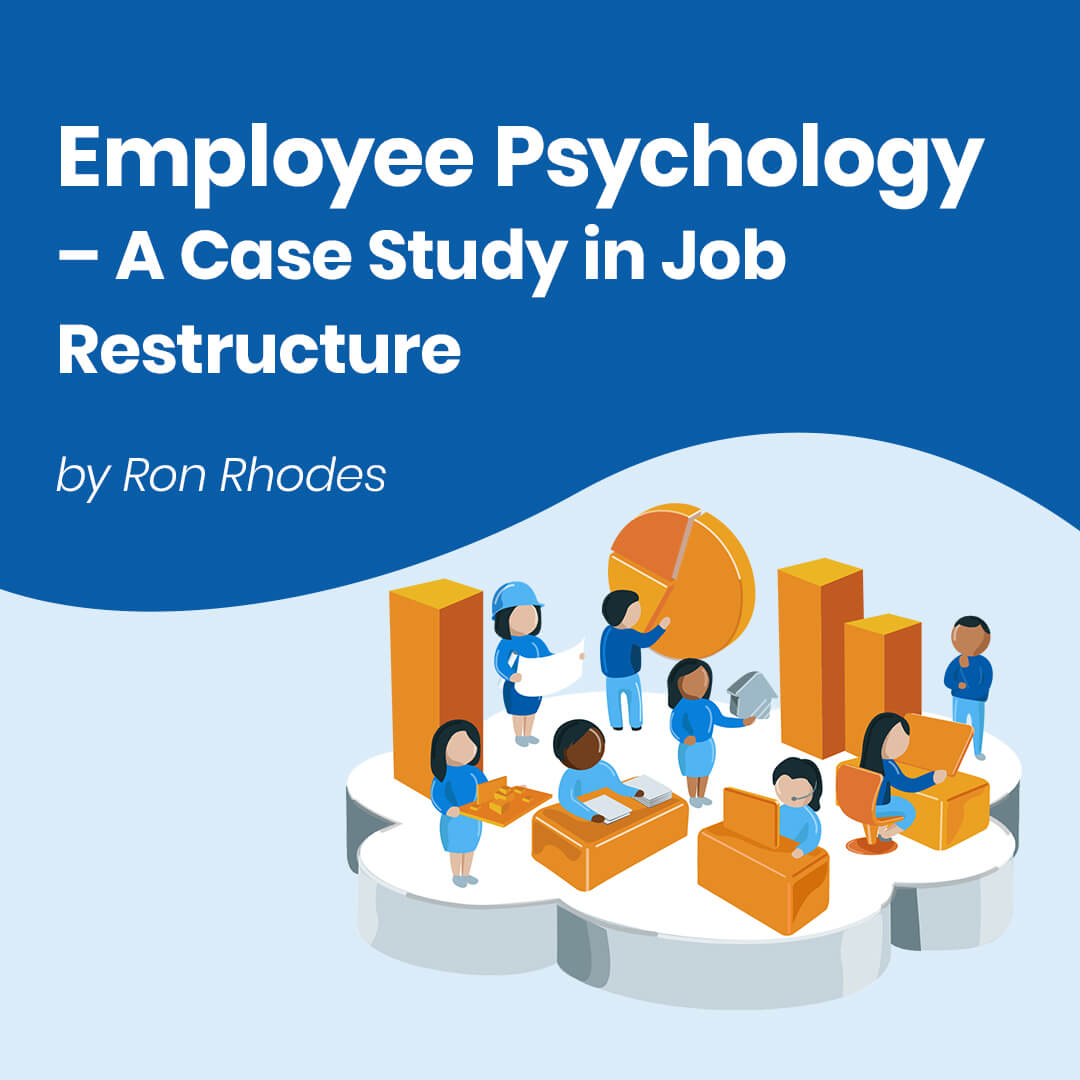Employee psychology – A case study in job restructure

Over the years, I have become more and more interested in Employee Psychology, the study of the thoughts, feelings, and behaviors of jobholders in modern society. And I will admit that my curiosity increased dramatically after moving from the US to the Philippines, almost 12 years ago.
By the time I boarded my, January 2008, departing flight to Manila, my career decisions had taken me through a number of US states. I had resided in New York (my home state), Utah, California, Connecticut, Nebraska, Texas, Virginia, Illinois and Florida and traveled extensively across the country. I found that employees in New Mexico, for example, had a number of things in common with employees in New Jersey, but also had differences as vastly opposed as the distance on the map. The regulatory environment, demographic makeup, and local culture played a large part in what drove the differences, as well as the similarities.
Employees in the Philippines are both, similar and unique. This beautiful South East Asian nation of 7,461 (at last count) tropical islands is home to some of the friendliest, most family-oriented, culturally and ethnically diverse people in all of Asia. The regulatory setting, however, is distinctly different from the US and takes some getting used to. While the country itself is a collage of eclectic expressions in which both, eastern and western influences are evident, the labor laws have a far less stringent focus on fair hiring practices than on job security and the protection of employee tenure. I intend to address this in another article, but suffice to say that the employee-oriented position of Philippine labor policies practically eliminates any need for the organized labor unions sometimes found in the US. All of this helps to present a characteristically different employee mindset when compared to many US states.
Understanding employee psychology is very beneficial to 21st Century organizations since it gives employers insights into dealing with a variety of employee personalities. Today’s psychologists acknowledge a conflict between an individual’s needs and those of the organization. Through employee psychology, they classify employee behavior into predictable patterns from which organizations can identify the best ways of dealing with individual employees…sometimes.
The example for this article is inspired by numerous similar observations I have made since arriving in the country. A few weeks back my company made a minor restructuring decision that affected one position. We had introduced new automation that gave us the ability to customize various reports and automatically distribute them on a scheduled basis. This (intentionally) reduced the workload of our administrative support team and exposed a number of administrative tasks as being redundant. As a result, we decided to reduce the support team by one employee.
As mentioned, the protection of tenure laws, specified in the published Philippine Labor Code, require a formula-calculated severance payment be made to the impacted person. We are happy to comply. However, we have a very family-oriented work culture so rather than lose a loyal family member, our overwhelming preference is to redeploy the employee in a role that matches their background and interests. There would or legally could be no reduction in salary and we would invest considerable effort in preparing the employee to be successful in their new job. Maybe not the best news an unsuspecting employee would receive during their workday, but security and company support could soften the blow.
In this particular case, the employee turned us down. The decision is not an unusual one and certainly their right. The reason given, on the other hand, is what I consider a psychological peculiarity. The employee, let’s call him Albert, was assigned an administrative support job that included running reports, ordering supplies and various other administrative tasks. As a Business Process Outsourcing (BPO) company, the vast majority of our personnel’s time is billable to our clients. That is the business model. But Albert, like a small fraction of our team did administrative work for the company. Consequently, his work was carried as a non-billable expense, a category good BPO leaders seek to reduce and/or control. Moving Albert to a new role that was not only billable to a client, but offered broader experience and professional growth seemed at first like a total win/win. But that’s not the way Albert saw it.
Albert saw the billable role, while comparable in salary grade and status, as a “step down.” The basis of Albert’s perspective was that the previous administrative job had less supervision and fewer measurable performance expectations. As Albert put it, there was a loss of freedom associated with the workday being offered. During the conversation with Albert, it became clear that the new role would be no more attractive if it came with raise in pay. Albert wanted a job where he was free to work on the tasks, he saw fit to work on, at a pace of his preference. In his mind, no job at all was the best second choice.
I listened to Albert while a number of thoughts raced through my head; two were dominant. First, the irony of Albert’s decision. Our company is located in a city where BPO companies are increasingly migrating and expanding; so much so that BPO jobs have become one the largest job categories in the area. Albert’s severance check will not last forever and the amount of available self-managed, administrative support jobs is infinitesimal when compared to inbound BPO call center agents, working the graveyard shift. Even if Albert is fortunate enough to land his dream job which is something, we all hope for, the probability is not in his favor. Why not take the transfer, see if you like the new role? If you don’t, you can always search for your dream job during your downtime?
The second thought is more personal to me. I grew up working in the clerical back office in a large US corporation, alongside people who had been performing the same tasks for decades. Seeing no future, I applied for a transfer to the company’s call center, earned rapid promotion and established a decent career over time. Worthy of note is the fact that the call center I transferred to still exists, many years later. The back-office tasks I once did have long been automated. There are no clerks anymore, just a lot of Alberts.
In the US, the same psychological question applied to Albert could apply to the millions that have trapped themselves in municipalities, waiting for the plant to return or the mine to open so they can dig for coal. Stubborn denial, as adequately displayed by Spencer Johnson’s Hem character in Who Moved My Cheese or even the stevedores in the season 2 or HBO’s The Wire, is not exclusively a Philippine phenomenon. There could be one of any number of causes, fear of change or even embarrassment, based on how others would perceive the change (likely in Albert’s case).
100 years ago, in 1919, Henry C. Link stated in his book, Employment Psychology, “The ideal employment method is undoubtedly an immense machine which would receive applicants of all kinds at one end, automatically sort, interview, and record them, and finally turn them out at the other end nicely labeled with the job which they are to do.” I would add that these jobs should not change, EVER, but if they do, we could simply send employees through the machine again. Short of this ideal, however, I continue to maintain that education and preparation are the best investments socially conscientious employers can make. We may never know why Albert decided not to adapt, but we can make his decision a more informed one.







 Independent
Independent




